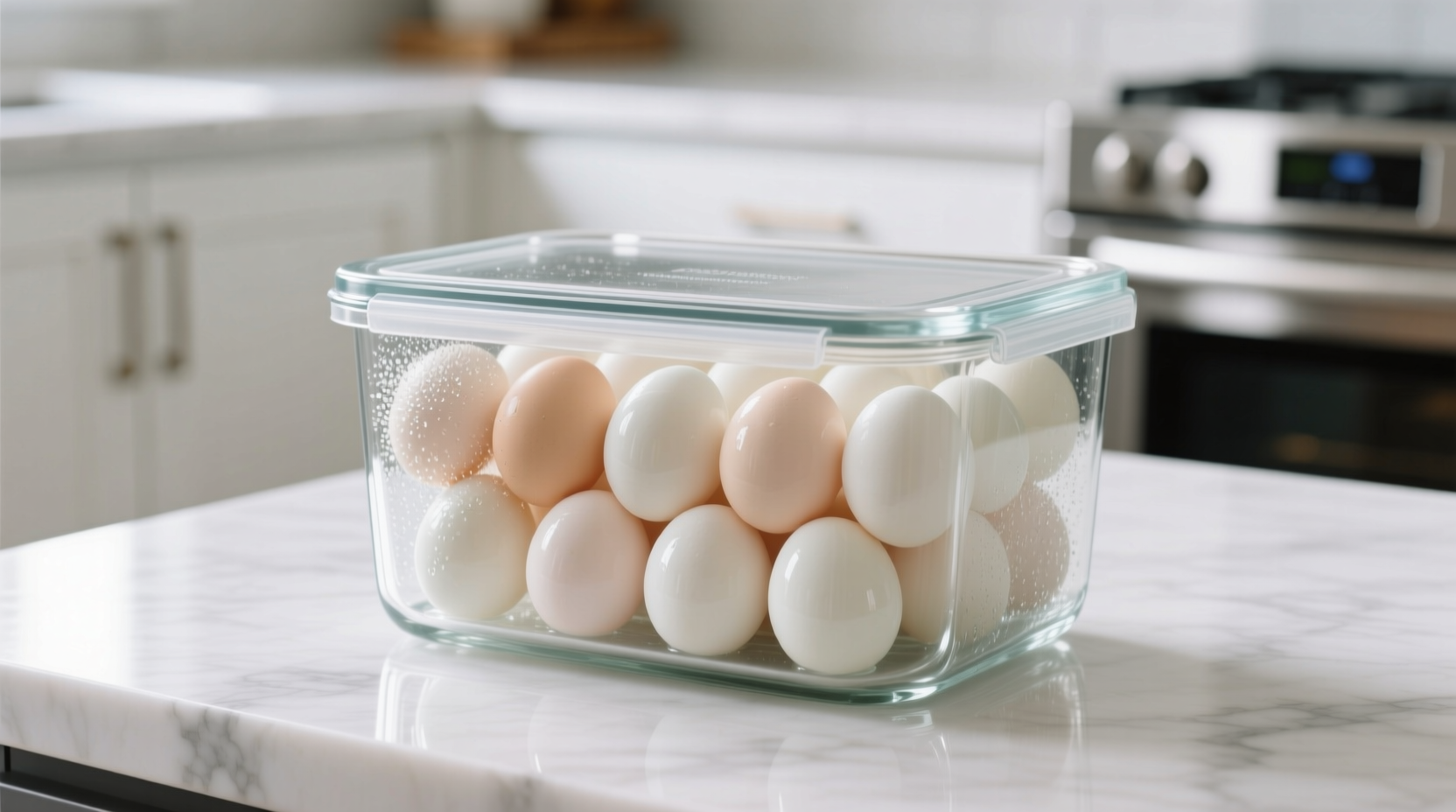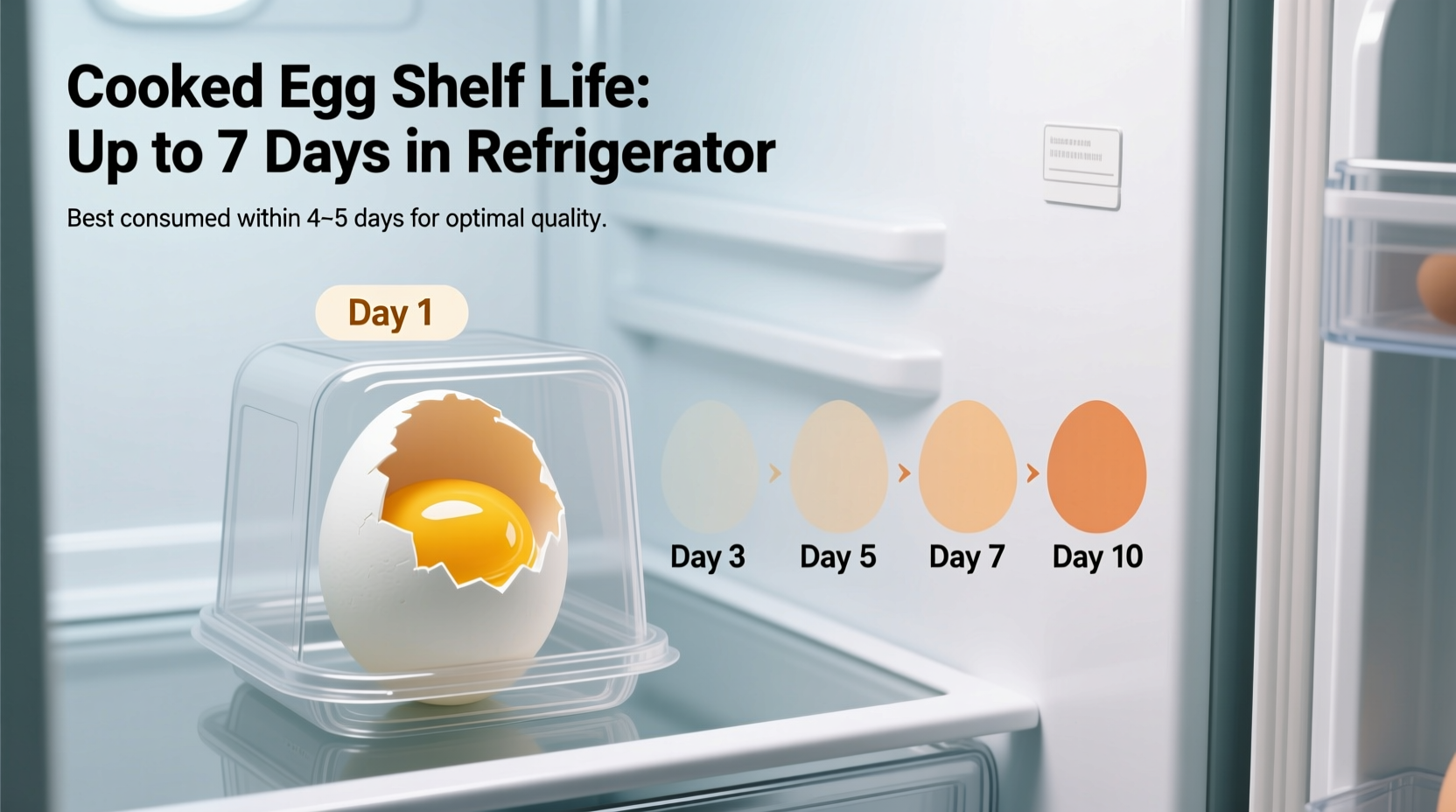Discover exactly how long your cooked eggs stay fresh in the refrigerator with science-backed storage guidelines that prevent food waste and keep your meals safe. This guide delivers actionable storage techniques used by professional chefs and food safety experts.
Why Proper Cooked Egg Storage Matters
Understanding cooked egg storage isn't just about convenience—it's a critical food safety practice. According to the USDA Food Safety and Inspection Service, eggs are considered a potentially hazardous food due to their protein content and neutral pH, creating ideal conditions for bacterial growth when improperly stored. The USDA recommends consuming cooked eggs within specific timeframes to prevent foodborne illness.
Storage Timelines for Different Cooked Egg Preparations
Your refrigerator's temperature significantly impacts how long cooked eggs remain safe. The FDA Food Code specifies that potentially hazardous foods should be kept at 41°F (5°C) or below. Here's exactly how long different cooked egg preparations last:
| Egg Preparation | Refrigerator Storage (40°F/4°C or below) | Key Storage Tip |
|---|---|---|
| Hard-boiled eggs (in shell) | Up to 7 days | Store in original carton away from strong-smelling foods |
| Hard-boiled eggs (peeled) | 3-4 days | Keep submerged in cold water changed daily |
| Scrambled or fried eggs | 3-4 days | Cool completely before storing in airtight container |
| Egg salad or deviled eggs | 3-4 days | Store filling separately from egg whites if possible |
| Quiches or frittatas | 3-4 days | Cut into portions before storing to maintain freshness |
Science-Backed Storage Techniques That Extend Freshness
Professional kitchens follow specific protocols to maximize cooked egg shelf life. The key factor is minimizing temperature fluctuations and moisture loss. Here's what food safety experts recommend:
- Immediate cooling: Place cooked eggs in an ice bath for 10-15 minutes before refrigerating to rapidly bring them below the danger zone (40-140°F)
- Airtight containers: Use containers with tight-fitting lids to prevent moisture loss and odor absorption
- Strategic placement: Store cooked eggs on refrigerator shelves (not in door compartments) where temperature remains most stable
- Water storage method: For peeled hard-boiled eggs, submerge completely in cold water and change water daily to maintain moisture barrier

When to Discard Cooked Eggs: Safety First
Following storage timelines is crucial, but sometimes eggs spoil prematurely. The USDA identifies these clear indicators that cooked eggs should be discarded immediately:
- Sulfur smell: That distinctive rotten egg odor indicates bacterial growth
- Slippery texture: Cooked eggs should never feel slimy to the touch
- Discoloration: Greenish-gray rings around yolks (while sometimes harmless) combined with other signs indicate spoilage
- Mold presence: Any visible mold growth means immediate disposal
Remember that harmful bacteria like Salmonella often don't produce visible changes. When in doubt, throw it out—especially for vulnerable populations like young children, elderly individuals, or those with compromised immune systems.
Maximizing Your Cooked Egg Experience
Smart storage isn't just about safety—it preserves flavor and texture. Professional chefs recommend these advanced techniques:
- Label containers with preparation date using masking tape
- Store hard-boiled eggs unpeeled until ready to eat
- Keep egg dishes away from raw meat products in your refrigerator
- Reheat scrambled eggs or frittatas with a splash of milk to restore moisture
For meal preppers, consider portioning cooked eggs into single-serving containers. This prevents repeated exposure to air and temperature changes that accelerate spoilage. The FDA Food Code emphasizes that each time food is removed from refrigeration, its remaining shelf life decreases proportionally.
Frequently Asked Questions About Cooked Egg Storage
These common questions address critical concerns about cooked egg safety and storage:
Can you freeze cooked eggs?
Yes, but texture changes occur. Scrambled eggs freeze best (up to 4 months), while hard-boiled egg whites become rubbery when frozen. Always cool completely and store in airtight freezer containers with minimal air exposure.
Why do hard-boiled eggs last longer in the shell?
The shell provides a natural protective barrier against moisture loss and bacterial contamination. Once peeled, eggs lose this protection and become more vulnerable to environmental factors that accelerate spoilage.
Does adding salt when boiling eggs affect storage time?
No, salt added during cooking doesn't significantly impact refrigerator storage time. However, salted egg dishes like egg salad may have slightly shorter shelf life due to increased moisture content from the added ingredients.
Can you tell if cooked eggs are bad by taste?
Never rely on taste to determine safety. Harmful bacteria like Salmonella don't always alter taste, smell, or appearance. If eggs have exceeded recommended storage times or show any signs of spoilage, discard them immediately without tasting.











 浙公网安备
33010002000092号
浙公网安备
33010002000092号 浙B2-20120091-4
浙B2-20120091-4